Imran Khan’s Rise to Prominence
Imran Khan’s journey from a cricket legend to the Prime Minister of Pakistan is a tale of determination, resilience, and unyielding commitment to his vision for the nation. Born in Lahore in 1952, Khan first gained international fame as a cricketing prodigy. His stellar cricket career, highlighted by leading Pakistan to its first-ever Cricket World Cup victory in 1992, cemented his status as a national hero. His prowess on the field was matched by his leadership skills, earning him a reputation as one of the greatest cricket captains in history.
Following his retirement from cricket, Khan channeled his popularity and resources into philanthropy. He founded the Shaukat Khanum Memorial Cancer Hospital in Lahore, named in honor of his mother. The hospital, a state-of-the-art facility providing free cancer treatment to those in need, stands as a testament to his commitment to addressing healthcare disparities in Pakistan. In addition, he established Namal University in Mianwali, aimed at providing quality education to underprivileged students. These philanthropic endeavors significantly bolstered his public image, portraying him as a compassionate leader with a deep concern for societal welfare.
Khan’s foray into politics began with the founding of Pakistan Tehreek-e-Insaf (PTI) in 1996. The early years of PTI were marked by limited political success and considerable challenges. Despite initial setbacks, including electoral defeats and internal party struggles, Khan remained steadfast in his vision for a “New Pakistan” characterized by justice, accountability, and economic prosperity. His perseverance gradually paid off, as PTI’s popularity grew, particularly among the youth and urban middle class disillusioned with the traditional political elite.
The major turning point in Khan’s political career came with the 2013 general elections, where PTI emerged as a formidable force, securing significant seats in the National Assembly. However, it was the 2018 general elections that marked Khan’s ultimate triumph. PTI won a majority of seats, enabling Khan to form a government and assume the office of Prime Minister. His rise to prominence in the political arena was not merely a result of his charismatic personality and cricketing fame but a reflection of his relentless pursuit of a transformative agenda for Pakistan.
Current Popularity and Public Opinion
Imran Khan’s current popularity in Pakistan can be attributed to a complex mix of achievements and shortcomings. During his tenure, Khan’s administration has implemented various economic policies aimed at stabilizing the country’s economy. Notably, his government has focused on increasing tax revenues, reducing fiscal deficits, and securing financial assistance from international bodies such as the International Monetary Fund (IMF). However, these measures have also led to criticism due to rising inflation and unemployment, which have adversely affected the public’s daily life.
Furthermore, Khan’s handling of the COVID-19 pandemic has been a double-edged sword in shaping public opinion. On one hand, the government’s swift response in terms of lockdowns, healthcare provisions, and vaccination drives has been lauded. On the other hand, the economic repercussions of these measures have fueled discontent among various segments of the population. Public sentiment gauged through recent surveys indicates a divided opinion, with a significant portion appreciating the health measures but expressing concerns over economic hardships.
In the realm of foreign relations, Imran Khan has taken a strong stance on issues such as the Kashmir conflict and relations with neighboring countries like India and Afghanistan. His administration has sought to position Pakistan as a key player on the international stage, which has garnered support domestically. However, these efforts have also met with skepticism from some quarters who question the long-term benefits of such strategies.
Domestically, Khan has pursued reforms aimed at improving governance and reducing corruption. Initiatives like the Ehsaas Program, aimed at social welfare, have been positively received. Yet, the effectiveness of these reforms remains a topic of debate, with opposition parties critiquing the government for not delivering on its promises. The political opposition’s stance, particularly from parties like the Pakistan Muslim League-Nawaz (PML-N) and the Pakistan Peoples Party (PPP), has been influential in shaping public perception, often highlighting the administration’s perceived failures.
Public opinion is also heavily influenced by social media trends, where Imran Khan’s policies and public appearances are frequently discussed and debated. Grassroots opinions reveal a mixed bag of support and criticism, reflecting the broader national sentiment. As the country looks ahead, Khan’s future prospects in Pakistani politics will likely depend on his ability to address economic challenges, maintain public health, and navigate the complex landscape of domestic and international relations.
